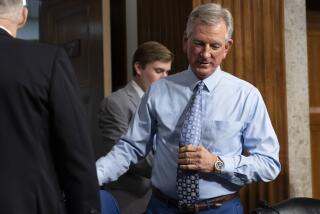On U.S. policy in Afghanistan, who’s running the show?
- Share via
When I visited Kabul this spring, a diplomat from a country that has sent thousands of troops to our war there asked a simple question that was actually an indictment. “Tell me,” he said, “who’s in charge of U.S. policy on Afghanistan?”
The same question came up in Washington last week as officials sorted through the impact of President Obama’s decision to replace his commander in Afghanistan, Gen. Stanley A. McChrystal, with Gen. David H. Petraeus.
“We still have one problem,” one official told me. “Who’s running the show?”
From the beginning, the Obama administration has had too many chiefs running its war effort in Afghanistan and neighboring Pakistan, and too many voices explaining it. The president and his aides hoped to end the dissension by settling on an 18-month surge of troops in December, but different players interpreted the policy in different ways: Vice President Joe Biden said it guaranteed a significant withdrawal of U.S. troops in July 2011, but Defense Secretary Robert M. Gates said the policy meant no such thing.
The U.S. ambassador in Afghanistan, retired Army Lt. Gen. Karl W. Eikenberry, is brilliant and ferociously hardworking, but he has collided repeatedly with Afghan President Hamid Karzai, with McChrystal and with his own State Department staff. Obama’s super-envoy for the region, Richard C. Holbrooke, is brilliant and ferociously hardworking, but he has collided repeatedly with Karzai, with Eikenberry and even with the White House. Who’s in charge here? Nobody’s sure.
In order for Petraeus, the nation’s savviest “political general,” to succeed militarily, he will have to help the president answer that nonmilitary question. He’s fixed a similar problem before -- in Iraq, where he served as U.S. military commander from 2007 to 2008.
Before Petraeus arrived in Baghdad, the U.S. command and the U.S. Embassy frequently clashed. But Petraeus and a new U.S. ambassador appointed at the same time, Ryan Crocker, ended the chaos by working deliberately on a seamless partnership -- in adjoining offices.
In Afghanistan, Petraeus actually faces three nonmilitary problems: First, he must help repair the military command’s relationship with the White House, which was frayed by the disclosures of disrespect and dissension on McChrystal’s staff.
Second, he must persuade Obama to fix the unhappy military-civilian partnership in Kabul. That probably means replacing Ambassador Eikenberry, whose relationship with Petraeus has not been notably close in the past.
Should Holbrooke be pushed out too? Insiders are divided on that question. But the special envoy is the State Department’s most accomplished negotiator -- and if negotiations with the Taliban are coming up, there’s an argument for keeping him in his job as long as the lines of authority can be made clearer.
And finally, Petraeus’ third nonmilitary job: Get more out of Karzai. When Petraeus was in Iraq, officials said, he relentlessly nudged Prime Minister Nouri Maliki to do what the United States wanted by offering favors if he helped and withdrawing them if he didn’t. That task would be easier in Afghanistan if Obama sends a new ambassador to Kabul, given Eikenberry’s rocky relationship with Karzai.
One of Petraeus’ first actions Wednesday, the day he was nominated, was to telephone Crocker, now dean of the Bush School of Government and Public Service at Texas A&M; University. Neither Petraeus nor Crocker would talk about their conversation, although Crocker told me emphatically that he has no interest in becoming the U.S. ambassador in Kabul.
But Crocker did spell out the problem. In Baghdad, the Iraqis needed to know that “they couldn’t game one of us against the other. Working together is a necessary condition for success -- but not a sufficient one,” he said. “We are not going to win the big fight if we spend our time on little fights with each other.”
Last week, Obama said that he had confidence in his current team, and aides said that meant no immediate changes were planned. Yet the president surely knows that by naming Petraeus, he has solved only one part of his problem. He filled the unexpected opening in the job of military commander, but he didn’t end the confusion over who is running the policy as a whole.
If Petraeus can help him find an answer to that question, he will deserve the job other officers think he wants: not president of the United States, but chairman of the Joint Chiefs of Staff. That post comes open in September 2011 -- shortly after Obama’s Afghanistan decision point of July 2011.
doyle.mcmanus@latimes.com
More to Read
Sign up for Essential California
The most important California stories and recommendations in your inbox every morning.
You may occasionally receive promotional content from the Los Angeles Times.











